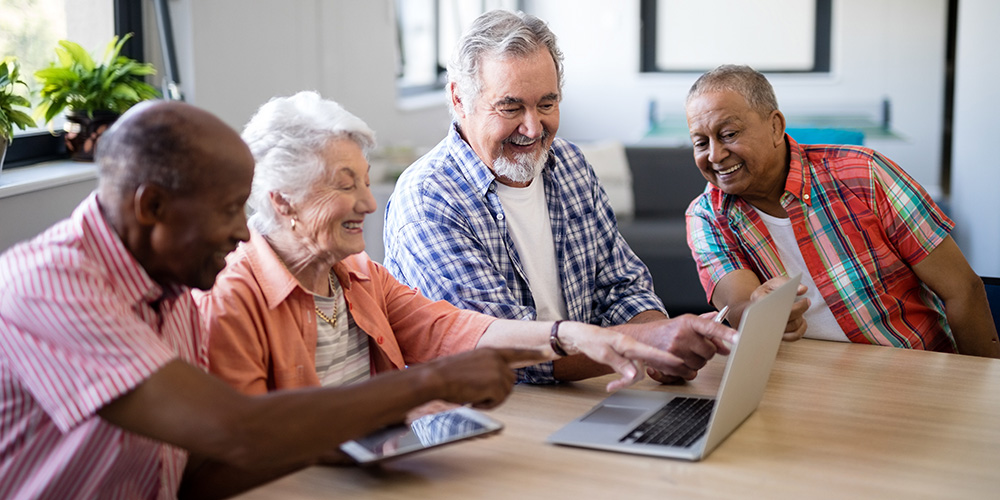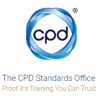
What are digital literacy skills?
Digital literacy skills are vitally important for many aspects of everyday life. Learn what digital literacy skills are, what they are needed for, and why they matter.
21 December 2021
Living in a society where communication and access to information is increasingly dependent on the use of digital technologies such as the internet, social media and personal mobile devices, is making digital literacy skills essential.
Keep reading to find out more about the different types of skills that make up of digital literacy, why they’re important, and how to keep your own digital literacy skills up to date.

What is digital literacy?
The term ‘Digital Literacy’ was first used in 1997 by Paul Glister and was defined as “the ability to both understand and use digitised information”. Now it also refers to the capabilities required to thrive i.e. be an effective and responsible participant in a digital society.
Watch this short video¹ to find out more about what digital literacy is:
¹The content in this video is independent and is neither affiliated with, nor authorised, sponsored, created or approved by Barclays. All trademarks are the property of their respective owners. There are other services available and Barclays does not specifically endorse or recommend the use of any services mentioned in this video.
A number of key aspects that make up digital literacy skills include:
- Communication: being able to convey your ideas and conduct yourself appropriately to communicate clearly in virtual environments
- Practical skills: being able to use technology to access, manage and create information in a digital and responsible way, and to maintain your knowledge. Technology, devices and systems are constantly evolving and it’s important to keep up to date
- Professional skills: being able to be professional is important in the work place, having digital literacy skills can help you remain professional as interactions are increasingly taking place in a digital environment, so being able to act and use information in appropriate ways is key
- Critical thinking: information can be created on digital platforms easily, so being able to identify what’s relevant and accurate is essential. Information on the internet can be used to educate, entertain or even deliberately mislead us. When this is combined with user generated websites such as Wikipedia, being unable to think critically can result in mistakes and the spread of misinformation
- Safety: Not everyone in the digital world has your best interests at heart. Knowing how to keep not only yourself, but your devices safe is paramount.

Why digital literacy skills are important
People who lack digital literacy skills could find it difficult to access key services and facilities within both their personal and professional lives, as the world we live in has been on a constant path of digital evolution since the first technologies thousands of years ago.
The global situation of 2020 saw a major shift in the importance of digital interactions. Spare rooms became offices and dining rooms became classrooms, with even social activities shifting into the realms of virtual. People without the necessary digital literacy skills or devices were left feeling isolated and digitally excluded.
Being digitally literate can impact each of the following:
- Education: digital literacy not only grants access to online resources and school materials but it also provides a diverse range of educational support tools that can support SEN (special educational needs) students, such as those with dyslexia.
- Work: being able to use basic office technologies such as emails and video conferencing tools is helpful, but colleagues with a wider range of digital skills can apply them to identify and enhance ways of working - allowing them to stand out against colleagues with lesser abilities. This can lead to innovation and new ways of working, and potential promotion or success at work.
- Communication: email and social media platforms require different skills to telephone, letter writing and face to face communication, and can help save time too.
- Banking: digital literacy skills are increasingly important for access to banking and financial products, as more people are switching to card and even mobile payment options. According to analysis conducted by finder.com by the end 2021, 38% of Brits either will have, or intend to have, a digital-only bank – equal to almost 20 million Brits.
- Research: having digital skills can open up your access to a wide range of information to help you in both your work and personal life. Having these skills can support you to use the internet safely, to help you find trusted tradespeople, fact check statistics for projects and if you’re able to use things like digital maps, review websites and e-booking tools, you could even book your next holiday entirely online.

What are examples of digital literacy skills?
Digital literacy skills are required for a lot of day to day things in the workplace and at home. You can even find digital skills being used for travel, and hobbies too. They digital landscape is constantly changing, but let’s take a quick look at some of the ways digital literacy skills might come in handy today.
1. Digital devices
Being able to use a digital device, such as a smart phone, laptop or tablet, is the first step to becoming digitally literate. Without an understanding of how devices operate and which device to use for which purpose, the rest of the digital skills will be difficult not only to learn but also to implement.
Digital devices come in all shapes and sizes from more traditional computers, like desktops and laptops to portable personal devices like tablets and smartphones. There are also a range of other devices such as wearables and VR headsets which have started to be used particularly in training environments.
2. Getting connected to the internet
Digital devices have an increasing reliance on being connected to the internet. It’s useful to know how to connect your digital technology to the internet, as without the skills required to connect to the digital world, the rest of digital literacy will be out of reach. The internet has become a part of everyday life, whether that’s for school, work or pleasure.
3. Using web browsers and search engines
A web browser is the digital tool you use to access the internet, and a search engine will help you gain access to the information you’re looking for – a new dress, ideas for planning a party or the best schools in the area you live in for instance.
Being able to access and sort the information and other digital resources you’ve found online then leads on to developing further digital literacy skills, as you continue to interact and use web browsers and search engines.

4. Social media
Social media is the term used to describe the range of digital platforms you can use to connect with friends, family or like-minded people online by sharing photos and videos you want other people to see, or sharing a funny story you heard at work.
They’re a bit like a social club or notice board, but online. Examples include Facebook and Twitter where you can share a mixture of text, video and photo content, Instagram which is used to mainly share photos, and TikTok that focuses on short, often funny videos.
Social media can be overwhelming for newer users, so it’s worth doing some research before creating an account, making sure you know how to tackle anything that you’re not comfortable with. You can find lots more information on social media, including how to stay safe using it in this course on Digital Wings.
5. Evaluating trustworthiness of online sources
Not everything that exists online is true or trustworthy. The more developed your digital skills are, the better chance you have at spotting whether something online is genuine or not.
Misinformation online such as fake news and parody content, as well as deliberately misleading or false images and articles can often be found online – particularly on social media. This type of information can cause confusion, distress and potentially harm, so knowing how to determine whether something is genuine is a good skill to have.
Most social media platforms have information in their guidelines about how they and you can deal with misinformation. Internet Matters have this helpful guide to help you spot fake news.
Cyber criminals use the internet to try and find their targets by using a variety of different methods to trick people. Take a look at this article in Digital Wings to understand some of the methods cyber criminals could be using, and how you can avoid being caught out.
6. Protecting your privacy
Once uploaded to the internet, data is at risk of copying, theft or loss. Knowing how to protect yourself and your data to reduce the risk of this happening is very important.
A strong and secure password is the best way of preventing access to your data, with unique passwords for each platform being the best method. However, since digital data is easily shared, once online it’s very difficult to remove, so it’s best to reduce these risks by not uploading or sharing any personal details or information that you wouldn’t want to be seen by others.

What are digital literacy tools?
There’s an ever-growing list of digital literacy tools available, but some which you may be more or less familiar with include:
Document creation tools, such as those used for word processing or spread sheet creation, even some that can be used for the creation of presentations; video software, used for both watching content but also the creation of your own videos; tools for accessing benefits or healthcare online; and a whole range of other apps that can be used for anything from the promotion of wellbeing to playing games for entertainment.
You can find out more about the types of digital skills that could help you in the workplace in this blog.
Digital literacy skills are not only essential for existing in the digital world - they’re necessary to thrive. Without access to devices and ongoing training it’s easy for someone to feel left behind and to struggle to access important facilities, as more and more of them are requiring a digital access route.
There's a wide range of support available which can be accessed easily. Barclays Digital Wings provides a platform designed to support everyone - from a basic introduction to digital skills, enabling you to bridge any gap that you currently have, further into a deeper level where you can continue to develop your skills, with regular updates and refreshers to ensure that your digital literacy skills always remain up to date.

